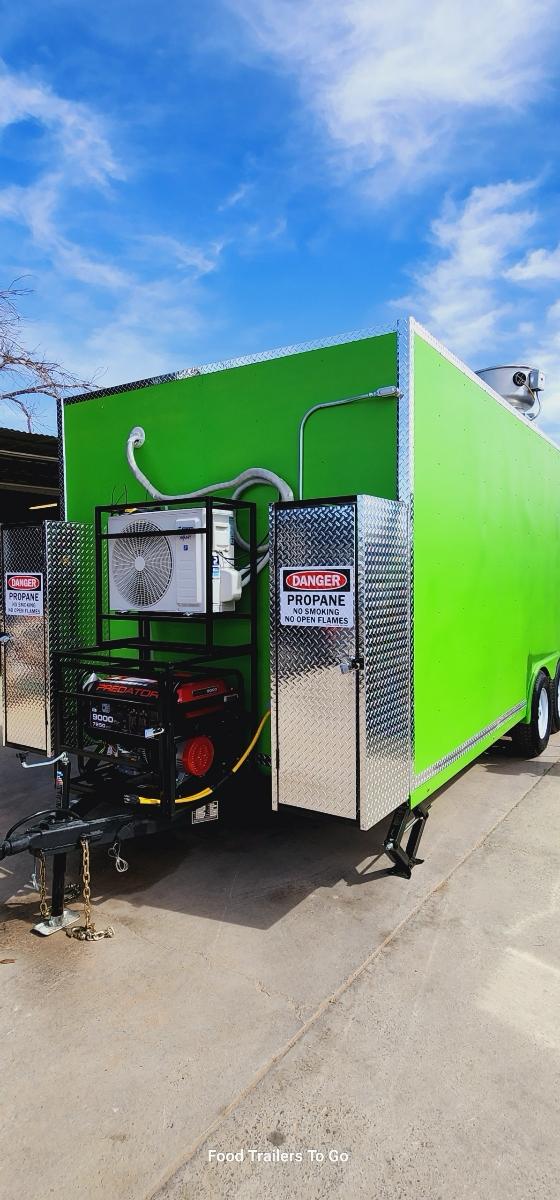Operating a food trailer is an exciting venture, offering culinary freedom and flexibility. However, it comes with unique challenges, especially in ensuring a comfortable and efficient environment for both staff and customers. One of the most critical considerations is selecting the right air conditioning unit. How to Choose the Best Air Conditioning Unit for Your Food Trailer: Comfort Meets Efficiency is essential to maintain an optimal working environment, preserve food safety, and enhance customer satisfaction. This guide dives deep into choosing the perfect unit to meet your specific needs.
What is Unique Cooling Needs of Food Trailers?
Food trailers have unique cooling requirements compared to stationary businesses. Unlike traditional kitchens, food trailers are compact, often parked in areas with varying weather conditions. The heat generated by cooking appliances, combined with the lack of natural ventilation, makes air conditioning a necessity rather than a luxury.
Key factors influencing cooling needs:
- Limited space requires compact and efficient solutions.
- High temperatures from cooking equipment.
- Frequent opening and closing of doors, causing temperature fluctuations.
- Operating in diverse climates with varying humidity levels.
Considering these factors ensures you choose an air conditioner that balances comfort and energy efficiency.
Types of Air Conditioning Units Suitable for Food Trailers
Selecting the right type of air conditioning unit is crucial. Here are the most popular options:
1. Roof-Mounted Air Conditioning Units
These units are a favorite for food trailers due to their space-saving design. Installed on the roof, they provide even cooling without occupying valuable interior space.
- Pros:
- Saves interior space.
- Effective cooling for small spaces.
- Durable and designed for mobile units.
- Cons:
- Installation can be costly.
- Requires roof reinforcement in some cases.
2. Portable Air Conditioners
Portable units are versatile and affordable. They can be placed inside the trailer and moved as needed.
- Pros:
- Affordable initial cost.
- Easy to install and move.
- Cons:
- Occupies floor space.
- May not be powerful enough for larger trailers.
3. Split-System Air Conditioners
These systems include an indoor unit and an outdoor compressor, offering efficient cooling and quieter operation.
- Pros:
- Quiet operation.
- Highly efficient cooling.
- Cons:
- Requires professional installation.
- Higher upfront cost.
4. Window-Mounted Air Conditioners
Window units are a budget-friendly option, ideal for smaller food trailers.
- Pros:
- Easy to install.
- Affordable.
- Cons:
- Limited cooling capacity.
- Occupies window space, reducing natural light.
Factors to Consider When Choosing an Air Conditioner
1. Cooling Capacity (BTUs)
British Thermal Units (BTUs) measure the cooling capacity of an air conditioner. Choosing the right BTU rating is critical:
- Small trailers: 5,000 – 8,000 BTUs.
- Medium trailers: 8,000 – 12,000 BTUs.
- Large trailers: 12,000+ BTUs.
Tip: An undersized unit will struggle to cool the space, while an oversized unit will waste energy.
2. Energy Efficiency
Energy efficiency is a top priority for food trailer operators. Look for units with high Energy Efficiency Ratio (EER) ratings and Energy Star certification.
3. Power Source
Consider the power setup in your trailer:
- Generator-Powered Units: Ideal for off-grid operations.
- Shore-Powered Units: Suitable for stationary setups with electrical hookups.
4. Noise Levels
A noisy air conditioner can disrupt the ambiance and communication inside your trailer. Opt for models with noise levels below 60 decibels (dB).
5. Installation and Maintenance
Choose a unit that’s easy to install and maintain. Regular maintenance ensures optimal performance and longevity.
6. Climate and Location
Consider the typical weather conditions where you operate. Trailers in humid areas may benefit from units with dehumidifiers.
Benefits of a Well-Chosen Air Conditioning Unit
Investing in the right air conditioning unit offers multiple advantages:
- Enhanced Comfort: Keeps staff productive and customers happy.
- Food Safety: Maintains the correct temperature to meet health regulations.
- Energy Savings: Reduces operating costs with efficient cooling.
- Brand Image: A comfortable environment reflects professionalism.
Comparing Top Air Conditioning Models for Food Trailers
| Model | Type | Cooling Capacity (BTUs) | EER Rating | Noise Level (dB) | Price Range |
|---|---|---|---|---|---|
| Dometic Penguin II | Roof-Mounted | 13,500 | 10.5 | 55 | $1,200 – $1,500 |
| Honeywell HL09CESWK | Portable | 9,000 | 9.5 | 52 | $400 – $600 |
| Pioneer Mini Split | Split-System | 12,000 | 10.3 | 42 | $900 – $1,300 |
| Frigidaire FFRE053WAE | Window-Mounted | 5,000 | 11.0 | 56 | $200 – $400 |
Installation Tips for Air Conditioning Units in Food Trailers
Proper installation is essential to maximize performance and efficiency:
- Ensure proper insulation to minimize heat transfer.
- Seal all gaps and openings to prevent cool air from escaping.
- Position the unit for optimal airflow, avoiding obstructions.
- Consult a professional for complex installations, especially roof-mounted or split systems.
Maintenance Tips to Extend Lifespan
Regular maintenance keeps your air conditioner running smoothly:
- Clean or replace filters every month.
- Inspect and clean the condenser coils regularly.
- Check for refrigerant leaks and fix them promptly.
- Schedule annual professional servicing.
Why Choose Food Trailers to Go for Your Cooling Solutions?
At Food Trailers to Go, we specialize in crafting custom food trailers tailored to your needs. Our designs prioritize comfort and efficiency, ensuring your air conditioning system integrates seamlessly. From expert guidance on How to Choose the Best Air Conditioning Unit for Your Food Trailer: Comfort Meets Efficiency to professional installation services, we’re here to help.
Contact Us Today:
- Phone: 915-255-6721
- Email: foodtrailerstogo@gmail.com
- Website: Food Trailers to Go
FAQs About Choose the Best Air Conditioning Unit
1. What size air conditioner is best for a food trailer?
The ideal size depends on your trailer’s dimensions. Smaller trailers require 5,000-8,000 BTUs, while larger ones may need 12,000+ BTUs.
2. Can I use a residential air conditioner in my food trailer?
It’s possible, but commercial or mobile-specific units are better suited for food trailers due to durability and efficiency.
3. How can I reduce energy consumption in my food trailer?
Use energy-efficient appliances, ensure proper insulation, and maintain your air conditioner regularly.
4. What is the average cost of installing an air conditioner in a food trailer?
Costs vary based on the type of unit and installation complexity, ranging from $500 to $2,000.
5. How often should I service my air conditioner?
Service your unit annually and clean filters monthly to ensure optimal performance.
6. Can portable air conditioners cool a food trailer effectively?
Yes, but they’re best for smaller trailers or as supplemental cooling.
7. What features should I look for in a food trailer air conditioner?
Prioritize energy efficiency, noise levels, cooling capacity, and ease of maintenance.
8. Is insulation important for air conditioning efficiency?
Absolutely. Proper insulation minimizes heat transfer, reducing the workload on your air conditioner.
Conclusion: Comfort Meets Efficiency
Choosing the best air conditioning unit for your food trailer ensures a comfortable, efficient, and productive environment. By considering factors like cooling capacity, energy efficiency, and your specific needs, you can make an informed decision. Food Trailers to Go provides expert advice and custom solutions, ensuring your food trailer remains a haven of comfort, even during the hottest days. Contact us today to elevate your food trailer experience.

